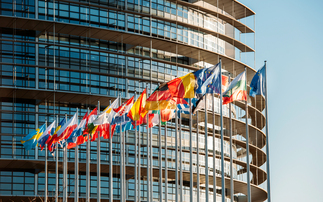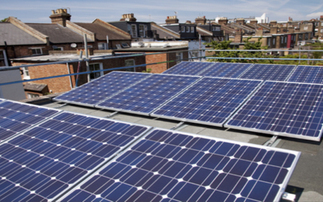John Kerry says any deal must be 'as ambitious as possible' and include regular reviews
US Secretary of State John Kerry has called on countries to reach an ambitious deal in the coming days at the Paris climate summit, confirming the US will double public grants to help poor countries cope with rising sea levels and extreme weather events caused by warming temperatures.
Speaking at the Paris climate change talks this afternoon, Kerry said the US plans to invest $800m in climate adaptation in developing countries a year, up from $400m in 2014.
In a wide-ranging speech, Kerry also revealed the US had joined the EU and low lying islands in a so-called "high ambition coalition" and urged countries to "get the job" done during the coming days and deliver a bold agreement.
He warned failure to reach a deal at the talks would make ministers "liable for a collective moral failure of historic consequence".
Ministers from nearly 200 countries meeting in Le Bourget, north of Paris, officially have less than three days left to reach a global deal to tackle climate change that is due to come into effect in 2020.
Kerry demanded an agreement that is "as ambitious as possible", arguing "we don't lose anything for being ambitious".
"Unless the global community takes bold steps now to transition away from a high carbon economy we are facing unthinkable harm to habitats, infrastructure, food production, water supplies and potentially to life itself," he warned.
Kerry also called for any deal to include a review system so countries can revisit their national climate action plans "regularly", with a view to increasing their ambition. "We didn't come to Paris to build a ceiling that contains all that we ever hope to do," he said. "We came to Paris to build a floor on which we can and must altogether continue to build."
Kerry's speech finished just moments before negotiators at the talks issued the latest draft negotiating text, which has been whittled down to 29 pages, with the core agreement now standing at just 14 pages.
Ministers have been given the afternoon to go away and discuss the three most contentious issues of finance, differentiation and "overall ambition".
Considerable disagreement remains on the crucial issue of how the text should distinguish between rich and poor nations. Industrialised nations are demanding a new approach on the grounds six of the world's richest countries by GDP per capita are still officially classified as 'non-annex one' developing nations.
But the BASIC group of large emerging economies, including China and India, have been resisting calls from industrialised nations for a rethink of how any agreement recognises the differences between nations that have previously been designated as rich or 'annex one' nations and developing or 'non-annex one' nations.
Kerry argued any agreement in Paris would inherently recognise the differences between countries because of the voluntary national action plans that nearly 195 nations have delivered ahead of the talks.
Andrew Steer, president and chief executive of the World Resources Institute, welcomed the US's latest finance pledge.
"The doubling of public commitments for adaptation is a very helpful development as we head into the final days in Paris," he said in a statement.
"These funds will increase the total pot of climate finance available to support vulnerable countries and shows the US commitment to reach a strong outcome. Climate finance is a sensible investment to increase resilience and reduce instability abroad."
Alongside the public finance commitments, Kerry hailed the support of the private sector in mobilising climate-related investment, namechecking CitiGroup, Goldman Sachs and Bank of America for their climate finance pledges.
Comparing international climate negotiations to a soap opera that barely changes over the years, Kerry said that in contrast to slow progress from politicians the private sector had delivered huge advances in clean technologies, with the cost of solar power falling by 80 per cent since the failed Copenhagen talks in 2009.
"If we send the right signal and make the right choices, the private sector will deliver," he added. "Because clean energy is not only the solution to climate change it is also one of the greatest economic opportunities the world has ever known."
This article is part of BusinessGreen's Road to Paris hub, hosted in association with PwC.








